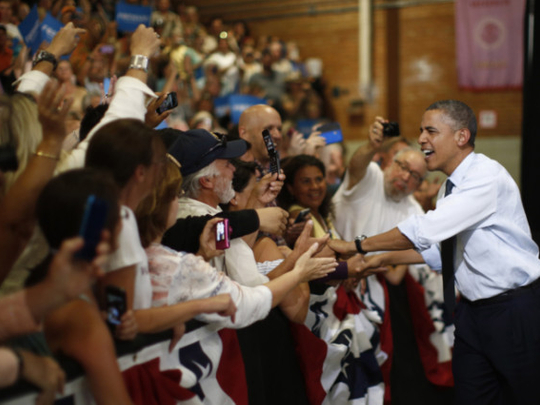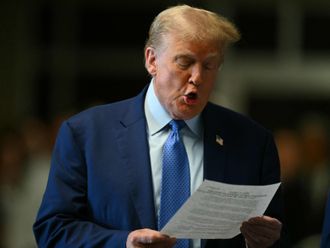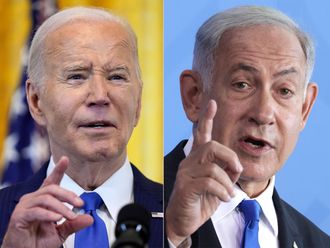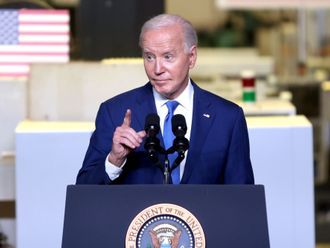
Des Moines/Denver: President Barack Obama and his Republican rival Mitt Romney traded barbs over the economy and women’s rights on Wednesday, each seeking an edge in critical states that could tip the result of the November 6 election.
Romney, who told supporters in drought-ravaged Iowa that their state felt like a “second home,” accused the Democratic president of mismanaging the economy and unraveling rules that require welfare recipients to get jobs.
A second term for Obama would lead to “chronic high levels of unemployment as far as the eye can see,” the former Massachusetts governor told an enthusiastic crowd at Des Moines’ Central High School.
“It’s tough to be middle class in America today,” he said.
Obama, meanwhile, began a two-day campaign swing in Colorado with a pitch to women voters, another key constituency in what is likely to be a close election that will hinge on politically divided states such as Colorado, Iowa, Ohio, Florida and Virginia.
He told a mainly female audience in Denver that Romney and his fellow Republicans wanted to limit access to birth control and would permit insurance companies to deny women coverage because of pre-existing conditions “like breast cancer or cervical cancer.”
“When it comes to a women’s right to make her own healthcare choices, they want to take us back to the policies more suited to the 1950s than the 21st century,” Obama said. “Colorado, you’ve got to make sure it does not happen.”
The president, who has been polling well ahead of Romney among women, referred to his mother’s struggle with cancer and his hopes for his daughters in a speech laced with personal references.
Obama was introduced at the event by Sandra Fluke, the Georgetown University law school graduate whom conservative talk-show host Rush Limbaugh called a “slut” earlier this year for her outspoken support of Obama’s contraception coverage policy.
Fluke’s emergence on the campaign trail signaled that Obama’s team - which has sought to cast Romney as an out-of-touch protector of the wealthy who is indifferent to the middle class - will seek to make the most of Obama’s advantage among women voters, which several polls have estimated to be in double digits.
Obama praised Fluke as a “tough and poised young lady,” adding that she “was brave to stand up for herself, and an eloquent advocate for women’s health.”
As the Obama and Romney campaigns traded blows, several new polls indicated that the president has a slight lead in the race for the White House, three months before election day.
A Reuters/Ipsos poll showed Obama’s lead over Romney among registered voters at 49 per cent to 42 per cent, up slightly from the 6-point advantage the president held a month earlier over the former Massachusetts governor.
Separately, an ABC News/Washington Post poll showed 49 per cent of Americans view Romney unfavourably, compared with 43 per cent of voters who gave Obama unfavourable marks.
And the latest poll from Quinnipiac University, CBS and the New York Times showed Obama ahead of Romney in Virginia and Wisconsin but trailing the Republican contender in Colorado.
Obama campaign spokeswoman Jennifer Psaki said there would be a tough fight in key states and her team was tailoring the president’s travel accordingly.
“We know the race is going to be close,” she told reporters aboard Air Force One. “We are not leaving any stone unturned, we are not taking any votes for granted.”
In an advertising blitz focused on a dozen pivotal states, Obama and his fellow Democrats have hammered Romney’s record as a private equity executive at Bain Capital, accusing him of plundering companies and shipping jobs overseas.
Romney has centred his race on the notion that he would be better than Obama at dealing with the economy - the dominant issue for voters, according to the Reuters/Ipsos poll.
His campaign spent $30.8 million on broadcast, cable and radio ads in July, compared to $50.3 million by the Obama camp, according to SMG Delta, which tracks political ad spending.
Much of the advertising firepower is held by independent political action committees, or “Super PACs,” that can raise and spend unlimited funds as long as they don’t coordinate with official campaigns.
Restore Our Future, the pro-Romney Super PAC, was absent from the airwaves for much of the summer but is back on television in 11 states with a $7.2 million ad buy that highlights Romney’s success at turning around the 2002 Salt Lake City Winter Olympics’ budget deficit.
The pro-Obama Super PAC Priorities USA has been running attack ads since early May and is planning to invest $20 million in its latest blitz.
The group has run six ads painting Romney as a cruel corporate raider, five of which feature workers laid off by companies bought out by Bain Capital.
Last week, Ken Goldstein of the ad buy-tracking firm Kantar Media said that of the $246.2 million spent on campaign ads in this election cycle, only 28 per cent went toward positive spots, while 72 per cent paid for negative ones. Most have focused on nine states: Colorado, Iowa, Nevada, New Hampshire, North Carolina, Ohio, Pennsylvania, Virginia and Florida.
Both candidates will focus their campaigning on “swing” states next week.
Romney is doing a bus tour in Virginia, North Carolina, Florida and Ohio starting tomorrow, and Obama will travel to Iowa for a three-day bus tour starting on Monday.












